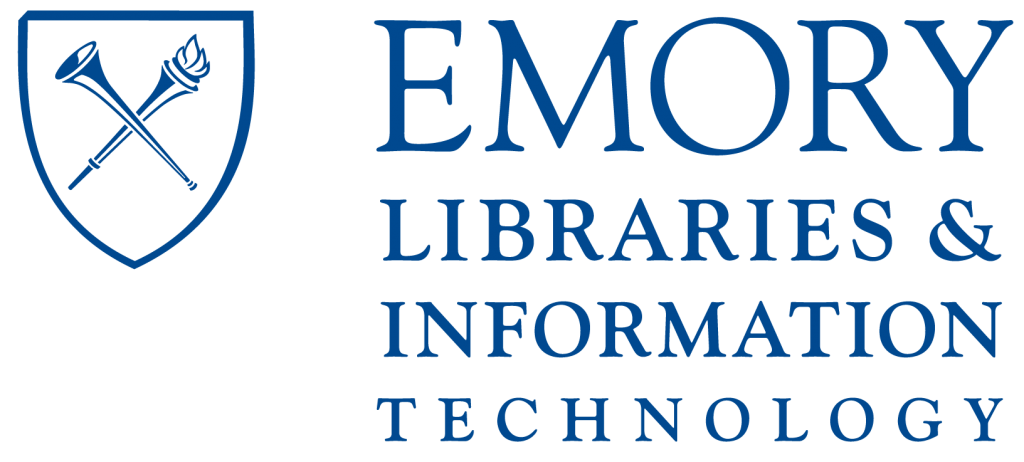from
Abraham Lincoln Medallion
-
Full Title
Abraham Lincoln by Franklin Simmons
-
Description
Medallion depicting profile relief of President Abraham Lincoln. In 1865, William Miller, the owner of the William H. Miller & Sons foundry in Providence, Rhode Island, commissioned sculptor Franklin Simmons to create a series of thirty-one medallions that included President Lincoln, his cabinet members, and Union generals and admirals. The medallions were displayed throughout northern cities. [This medallion was not restored.]
-
Source
The Abraham Lincoln Foundation of The Union League of Philadelphia (Object ID: 2004.55.11)
-
Rights
Use of this item for research, teaching and private study is permitted with proper citation and attribution, as “Courtesy of The Abraham Lincoln Foundation of The Union League of Philadelphia.” Reproduction of this item for publication, broadcast or commercial use requires written permission. For permission, please contact The Abraham Lincoln Foundation.
-
Tags
-
Cite this Item
Franklin Simmons. "Abraham Lincoln by Franklin Simmons". Remembering Lincoln. Web. Accessed December 14, 2025. https://rememberinglincoln.fords.org/node/999
from
Abraham Lincoln by Franklin Simmons
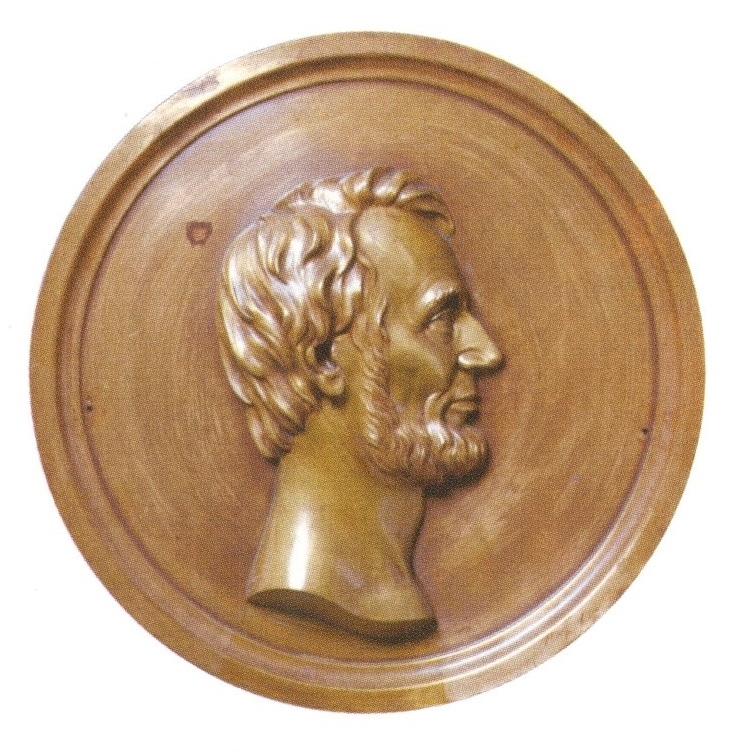
-
Description
Medallion depicting profile relief of President Abraham Lincoln. In 1865, William Miller, the owner of the William H. Miller & Sons foundry in Providence, Rhode Island, commissioned sculptor Franklin Simmons to create a series of thirty-one medallions that included President Lincoln, his cabinet members, and Union generals and admirals. The medallions were displayed throughout northern cities. [This medallion was not restored.]
-
Source
The Abraham Lincoln Foundation of The Union League of Philadelphia (Object ID: 2004.55.11)
-
Rights
Use of this item for research, teaching and private study is permitted with proper citation and attribution, as “Courtesy of The Abraham Lincoln Foundation of The Union League of Philadelphia.” Reproduction of this item for publication, broadcast or commercial use requires written permission. For permission, please contact The Abraham Lincoln Foundation.
-
Creator
Franklin Simmons
-
Material
copper alloy, bronze, wood
-
Dimensions
22 inches in diameter
from
Abraham Lincoln Medallion
-
Full Title
Abraham Lincoln by Franklin Simmons
-
Description
Medallion depicting profile relief of President Abraham Lincoln. In 1865, William Miller, the owner of the William H. Miller & Sons foundry in Providence, Rhode Island, commissioned sculptor Franklin Simmons to create a series of thirty-one medallions that included President Lincoln, his cabinet members, and Union generals and admirals. The medallions were displayed throughout northern cities. This medallion was restored to its original 1865 appearance.
-
Source
The Abraham Lincoln Foundation of The Union League of Philadelphia (Object ID: 2004.55.10)
-
Rights
Use of this item for research, teaching and private study is permitted with proper citation and attribution, as “Courtesy of The Abraham Lincoln Foundation of The Union League of Philadelphia.” Reproduction of this item for publication, broadcast or commercial use requires written permission. For permission, please contact The Abraham Lincoln Foundation.
-
Tags
-
Cite this Item
Franklin Simmons. "Abraham Lincoln by Franklin Simmons". Remembering Lincoln. Web. Accessed December 14, 2025. https://rememberinglincoln.fords.org/node/998
from
Abraham Lincoln by Franklin Simmons
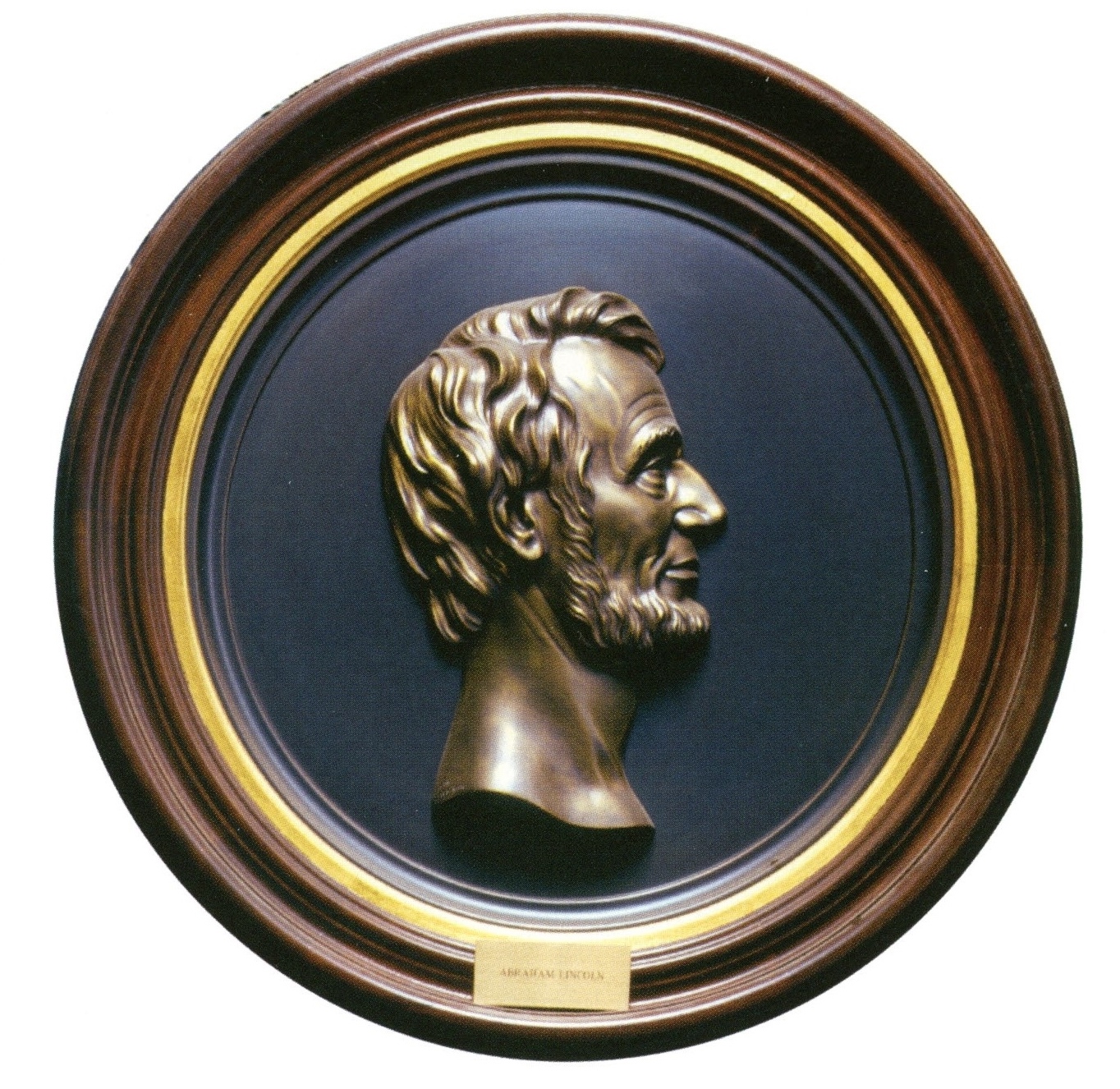
-
Description
Medallion depicting profile relief of President Abraham Lincoln. In 1865, William Miller, the owner of the William H. Miller & Sons foundry in Providence, Rhode Island, commissioned sculptor Franklin Simmons to create a series of thirty-one medallions that included President Lincoln, his cabinet members, and Union generals and admirals. The medallions were displayed throughout northern cities. This medallion was restored to its original 1865 appearance.
-
Source
The Abraham Lincoln Foundation of The Union League of Philadelphia (Object ID: 2004.55.10)
-
Rights
Use of this item for research, teaching and private study is permitted with proper citation and attribution, as “Courtesy of The Abraham Lincoln Foundation of The Union League of Philadelphia.” Reproduction of this item for publication, broadcast or commercial use requires written permission. For permission, please contact The Abraham Lincoln Foundation.
-
Creator
Franklin Simmons
-
Material
Copper alloy, bronze, walnut wood
-
Dimensions
22 inches in diameter
from Apr. 15, 1865
Clara Barton's Diary
-
Full Title
Clara Barton's Diary
-
Description
Clara Barton, who in 1865 was directing the Missing Soldiers Office answering families' pleas for information on their loved ones, responded with few words to the Lincoln assassination. The Missing Soldiers Office was located three blocks east of Ford's Theatre. In few words, she described the confusion that Washingtonians felt after the event and the anguish that she felt, both over the death of the president as well as the death of her nephew the previous week–sometimes conflating the two.
-
Transcription
Friday, April 14, 1865
Assassination of President
Lincoln
Was returning from a call at
Mr. Upperman’s when it was
Rumored on the street.
Saturday, April 15, 1865
President Lincoln died at
7- o clock this morning
the whole city in gloom
no one knows what to do
Dr. Sidney came
Vice President Johnson
Inaugurated President
Sunday, April 16, 1865
Assassins not detected.
Known to be J. Wilks Booth,
The attempted murder of Mr.
Seward + family was sup-
posed to be by one Surrat-
I was quiet all day.
Monday, April 17, 1865
Attempted to offer some help
Went to Surg Genl office
Could get no one.
The President embalmed in
Preparation to be laid in state
Tomorrow,
Mailed 100 letters
Tuesday, April 18, 1865
President Lincoln laid in
State—dept went in bodies
To see him. Resolutaions passed
at the Mars rooms in
Honor of the President and
Commemoration of poor Irving
Fannie not returned –
Heard this evening that
The assassination of Mr. Seward[?]
Had been arrested at –
2 o clock this morning
- dressed as a laborer, on HE st –
Borrowed some tables to write on
Wednesday, April 19, 1865
Funeral of President Lincoln
I remained in doors all day.
Thursday, April 20, 1865
President lain in state
At the capital
Sally + Fannie + Vester
Return from Mas.
Poor Bubby is at rest –
Friday, April 21, 1865
President Lincoln remains
taken on to Baltimore
great search for Booth -
[Transcription provided by the National Museum of Civil War Medicine and Clara Barton Missing Soldiers Office Museum.] -
Source
-
Rights
This item is in the public domain.
-
Tags
-
Cite this Item
Clara Barton. "Clara Barton's Diary". Remembering Lincoln. Web. Accessed December 14, 2025. https://rememberinglincoln.fords.org/node/997
-
Creator
Clara Barton
-
Date
April 15, 1865
from Apr. 15, 1865
Clara Barton's Diary

-
Description
Clara Barton, who in 1865 was directing the Missing Soldiers Office answering families' pleas for information on their loved ones, responded with few words to the Lincoln assassination. The Missing Soldiers Office was located three blocks east of Ford's Theatre. In few words, she described the confusion that Washingtonians felt after the event and the anguish that she felt, both over the death of the president as well as the death of her nephew the previous week–sometimes conflating the two.
-
Source
-
Rights
This item is in the public domain.
-
Creator
Clara Barton
-
Date
April 15, 1865
from Apr. 19, 1865
An Address in Commemoration of Abraham Lincoln
-
Full Title
An Address in Commemoration of Abraham Lincoln
-
Description
Sermon delivered by Rev. George Dana Boardman in the Meeting-House of the First Baptist Church of Philadelphia.
-
Transcription
Transcript available on The Martyred President: Sermons Given on the Occasion of the Assassination of Abraham Lincoln
-
Source
-
Rights
This item is in the public domain. As a service to other researchers, we request that users credit the Emory University Libraries as the source.
-
Tags
-
Cite this Item
Rev. George Dana Boardman. "An Address in Commemoration of Abraham Lincoln". Sherman & Co., Printers. Remembering Lincoln. Web. Accessed December 14, 2025. https://rememberinglincoln.fords.org/node/996
from Apr. 19, 1865
An Address in Commemoration of Abraham Lincoln
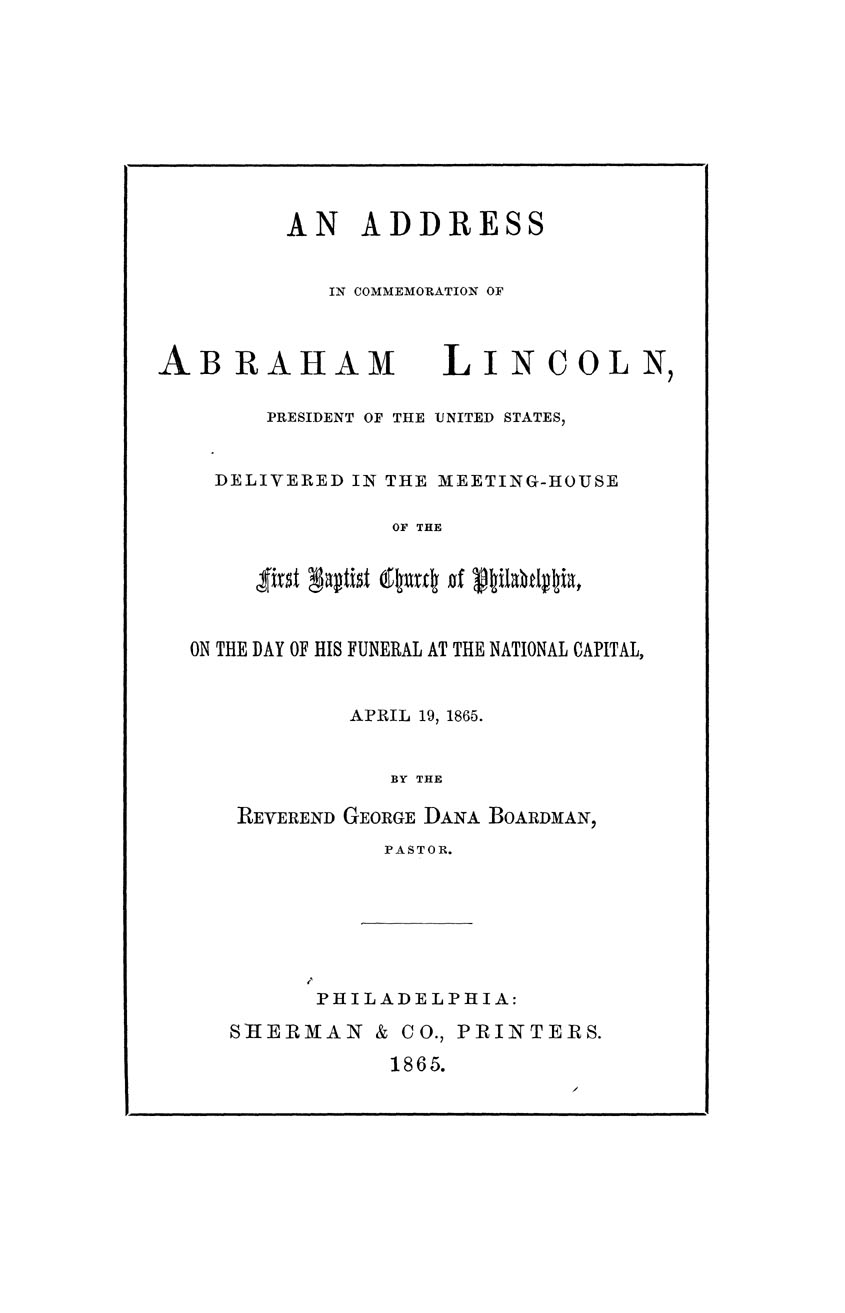
-
Description
Sermon delivered by Rev. George Dana Boardman in the Meeting-House of the First Baptist Church of Philadelphia.
-
Source
-
Rights
This item is in the public domain. As a service to other researchers, we request that users credit the Emory University Libraries as the source.
-
Creator
Rev. George Dana Boardman
-
Publisher
Sherman & Co., Printers
-
Date
April 19, 1865
from Apr. 16, 1865
Death, the Law of Life
-
Full Title
Death, the Law of Life
-
Description
Sermon delivered by Rev. George Dana Boardman in the Meeting-House of the First Baptist Church of Philadelphia.
-
Transcription
Transcript available on The Martyred President: Sermons Given on the Occasion of the Assassination of Abraham Lincoln
-
Source
-
Rights
This item is in the public domain. As a service to other researchers, we request that users credit the Emory University Libraries as the source.
-
Tags
-
Cite this Item
Rev. George Dana Boardman. "Death, the Law of Life". Sherman & Co., Printers. Remembering Lincoln. Web. Accessed December 14, 2025. https://rememberinglincoln.fords.org/node/995
from Apr. 16, 1865
Death, the Law of Life

-
Description
Sermon delivered by Rev. George Dana Boardman in the Meeting-House of the First Baptist Church of Philadelphia.
-
Source
-
Rights
This item is in the public domain. As a service to other researchers, we request that users credit the Emory University Libraries as the source.
-
Creator
Rev. George Dana Boardman
-
Publisher
Sherman & Co., Printers
-
Date
April 16, 1865
from Jun. 1, 1865
The Providential Significance of the Death of Abraham Lincoln
-
Full Title
The Providential Significance of the Death of Abraham Lincoln
-
Description
Sermon delivered by Robert B. Yard in the Central M.E. Church, Newark, New Jersey.
-
Transcription
Transcript available on The Martyred President: Sermons Given on the Occasion of the Assassination of Abraham Lincoln
-
Source
-
Rights
This item is in the public domain. As a service to other researchers, we request that users credit the Emory University Libraries as the source.
-
Cite this Item
Robert B. Yard. "The Providential Significance of the Death of Abraham Lincoln". H. Harris. Remembering Lincoln. Web. Accessed December 14, 2025. https://rememberinglincoln.fords.org/node/994
from Jun. 1, 1865
The Providential Significance of the Death of Abraham Lincoln

-
Description
Sermon delivered by Robert B. Yard in the Central M.E. Church, Newark, New Jersey.
-
Source
-
Rights
This item is in the public domain. As a service to other researchers, we request that users credit the Emory University Libraries as the source.
-
Creator
Robert B. Yard
-
Publisher
H. Harris
-
Date
June 1, 1865
from Apr. 16, 1865
A Discourse on the Death of President Lincoln
-
Full Title
A Discourse on the Death of President Lincoln
-
Description
Sermon delivered by Denis Wortman in the First Reformed Dutch Church, of Schenectady, New York
-
Transcription
Transcript available on The Martyred President: Sermons Given on the Occasion of the Assassination of Abraham Lincoln
-
Source
-
Rights
This item is in the public domain. As a service to other researchers, we request that users credit the Emory University Libraries as the source.
-
Tags
-
Cite this Item
Denis Wortman. "A Discourse on the Death of President Lincoln". Weed, Parsons & Company. Remembering Lincoln. Web. Accessed December 14, 2025. https://rememberinglincoln.fords.org/node/993
from Apr. 16, 1865
A Discourse on the Death of President Lincoln
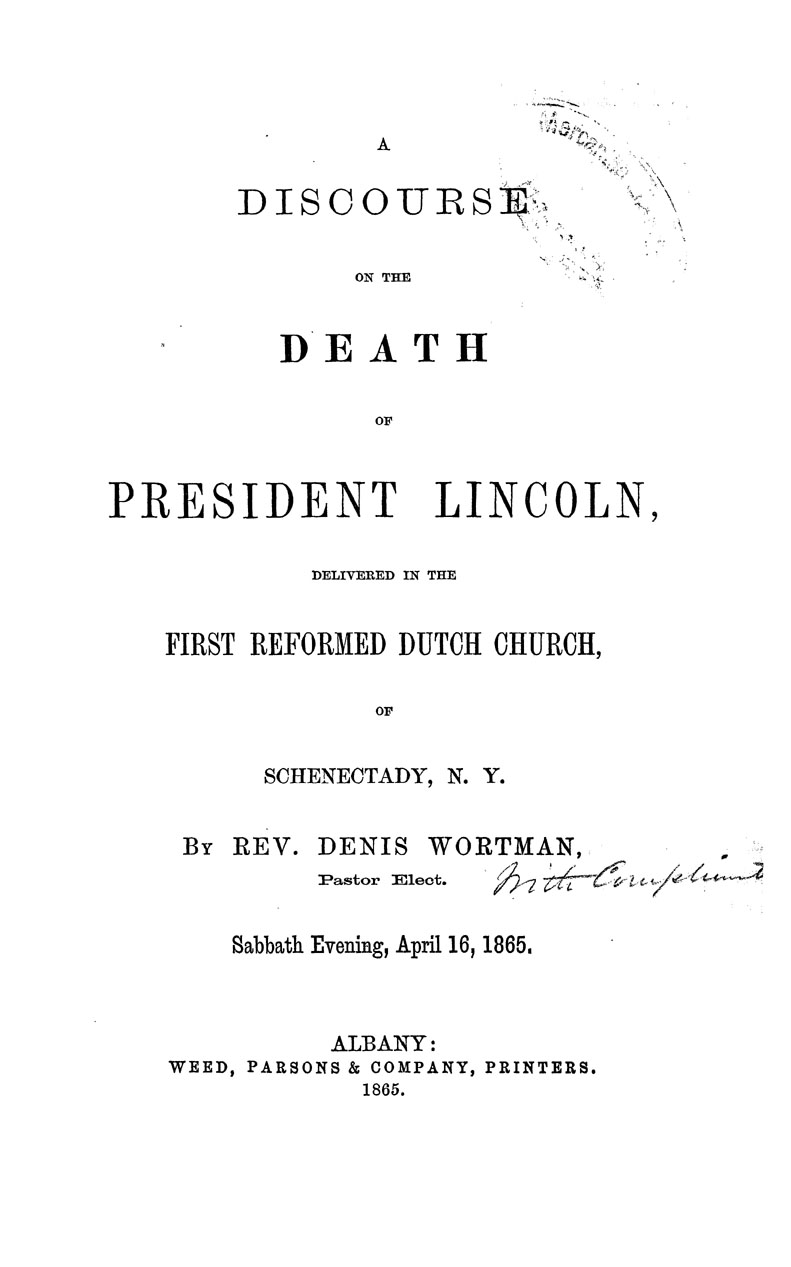
-
Description
Sermon delivered by Denis Wortman in the First Reformed Dutch Church, of Schenectady, New York
-
Source
-
Rights
This item is in the public domain. As a service to other researchers, we request that users credit the Emory University Libraries as the source.
-
Creator
Denis Wortman
-
Publisher
Weed, Parsons & Company
-
Date
April 16, 1865
from Apr. 23, 1865
A Sermon, Occasioned by the Assassination of Abraham Lincoln, President of the United States
-
Full Title
A Sermon, Occasioned by the Assassination of Abraham Lincoln, President of the United States
-
Description
Sermon preached by Pliny H. White at Coventry, Vermont. Whine opens his remarks by addressing the severity of the loss of President Lincoln, the first president ever assassinated. He praises Lincoln for his personal virtues, public service, and personal magnetism. He also compares the death of Lincoln to other rulers in history and religious leaders like Moses, and what Scripture says on how to mourn such losses. Whine hopes that the sermon today will help pay respects to the fallen president, seek consolation and consider current duties in the face of turmoil. During the 19th century, it became popular to publish sermons in newspapers and magazines. Both the Union and the Confederacy reported increased religious fervor during the war. "Abraham Lincoln struggled personally with trying to understand the war in religious terms. Many, including Lincoln, came to see the war as a punishment for disunity and religious failures. A powerful theme of the sermons is the providence of God. Many people viewed Lincoln as a martyr, and often he was compared to Moses, Abraham, and George Washington. Lincoln's assassination took place on Good Friday, so most sermons about his death occurred that following Sunday at services." - The Martyred President, Emory University Libraries.
-
Transcription
Transcript available on The Martyred President: Sermons Given on the Occasion of the Assassination of Abraham Lincoln
-
Source
-
Rights
This item is in the public domain. As a service to other researchers, we request that users credit the Emory University Libraries as the source.
-
Tags
-
Cite this Item
Pliny H. White. "A Sermon, Occasioned by the Assassination of Abraham Lincoln, President of the United States". The Vermont Record Office. Remembering Lincoln. Web. Accessed December 14, 2025. https://rememberinglincoln.fords.org/node/992
from Apr. 23, 1865
A Sermon, Occasioned by the Assassination of Abraham Lincoln, President of the United States
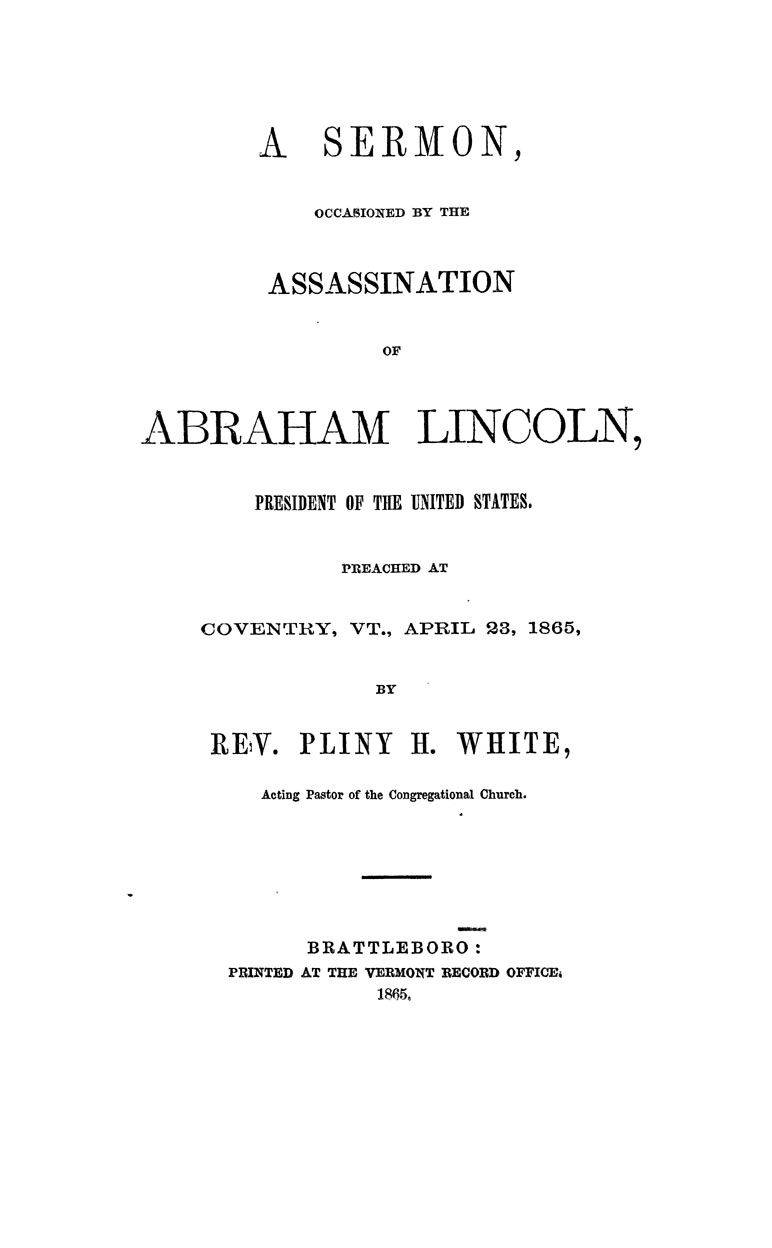
-
Description
Sermon preached by Pliny H. White at Coventry, Vermont. Whine opens his remarks by addressing the severity of the loss of President Lincoln, the first president ever assassinated. He praises Lincoln for his personal virtues, public service, and personal magnetism. He also compares the death of Lincoln to other rulers in history and religious leaders like Moses, and what Scripture says on how to mourn such losses. Whine hopes that the sermon today will help pay respects to the fallen president, seek consolation and consider current duties in the face of turmoil. During the 19th century, it became popular to publish sermons in newspapers and magazines. Both the Union and the Confederacy reported increased religious fervor during the war. "Abraham Lincoln struggled personally with trying to understand the war in religious terms. Many, including Lincoln, came to see the war as a punishment for disunity and religious failures. A powerful theme of the sermons is the providence of God. Many people viewed Lincoln as a martyr, and often he was compared to Moses, Abraham, and George Washington. Lincoln's assassination took place on Good Friday, so most sermons about his death occurred that following Sunday at services." - The Martyred President, Emory University Libraries.
-
Source
-
Rights
This item is in the public domain. As a service to other researchers, we request that users credit the Emory University Libraries as the source.
-
Creator
Pliny H. White
-
Publisher
The Vermont Record Office
-
Date
April 23, 1865
from Mar. 31, 1865
Memorial Sermons
-
Full Title
Memorial Sermons
-
Description
Sermon delivered by Edwin B. Webb at Shawmut Church, Boston, Massachusetts.
-
Transcription
Transcript available on The Martyred President: Sermons Given on the Occasion of the Assassination of Abraham Lincoln
-
Source
-
Rights
This item is in the public domain. As a service to other researchers, we request that users credit the Emory University Libraries as the source.
-
Tags
-
Cite this Item
Edwin B. Webb. "Memorial Sermons". Press of Geo. C. Rand & Avery. Remembering Lincoln. Web. Accessed December 14, 2025. https://rememberinglincoln.fords.org/node/991
from Mar. 31, 1865
Memorial Sermons
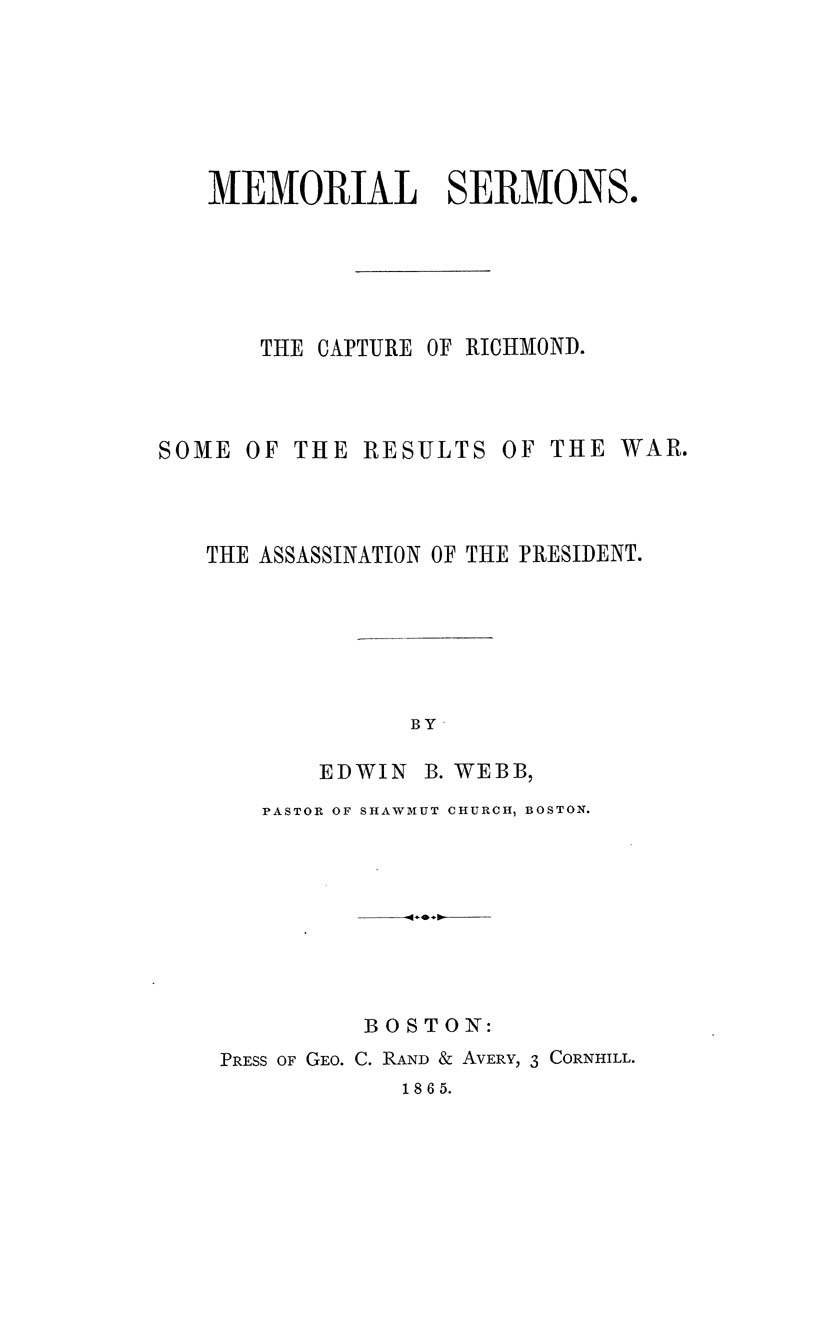
-
Description
Sermon delivered by Edwin B. Webb at Shawmut Church, Boston, Massachusetts.
-
Source
-
Rights
This item is in the public domain. As a service to other researchers, we request that users credit the Emory University Libraries as the source.
-
Creator
Edwin B. Webb
-
Publisher
Press of Geo. C. Rand & Avery
-
Date
March 31, 1865
from Apr. 30, 1865
The Conflict of Truth
-
Full Title
The Conflict of Truth
-
Description
Sermon preached by Villeroy Dibble Reed In The First Presbyterian Church, Camden, New Jersey.
-
Transcription
Transcript available on The Martyred President: Sermons Given on the Occasion of the Assassination of Abraham Lincoln
-
Source
-
Rights
This item is in the public domain. As a service to other researchers, we request that users credit the Emory University Libraries as the source.
-
Cite this Item
Villeroy Dibble Reed. "The Conflict of Truth". S. Chew. Remembering Lincoln. Web. Accessed December 14, 2025. https://rememberinglincoln.fords.org/node/990
from Apr. 30, 1865
The Conflict of Truth
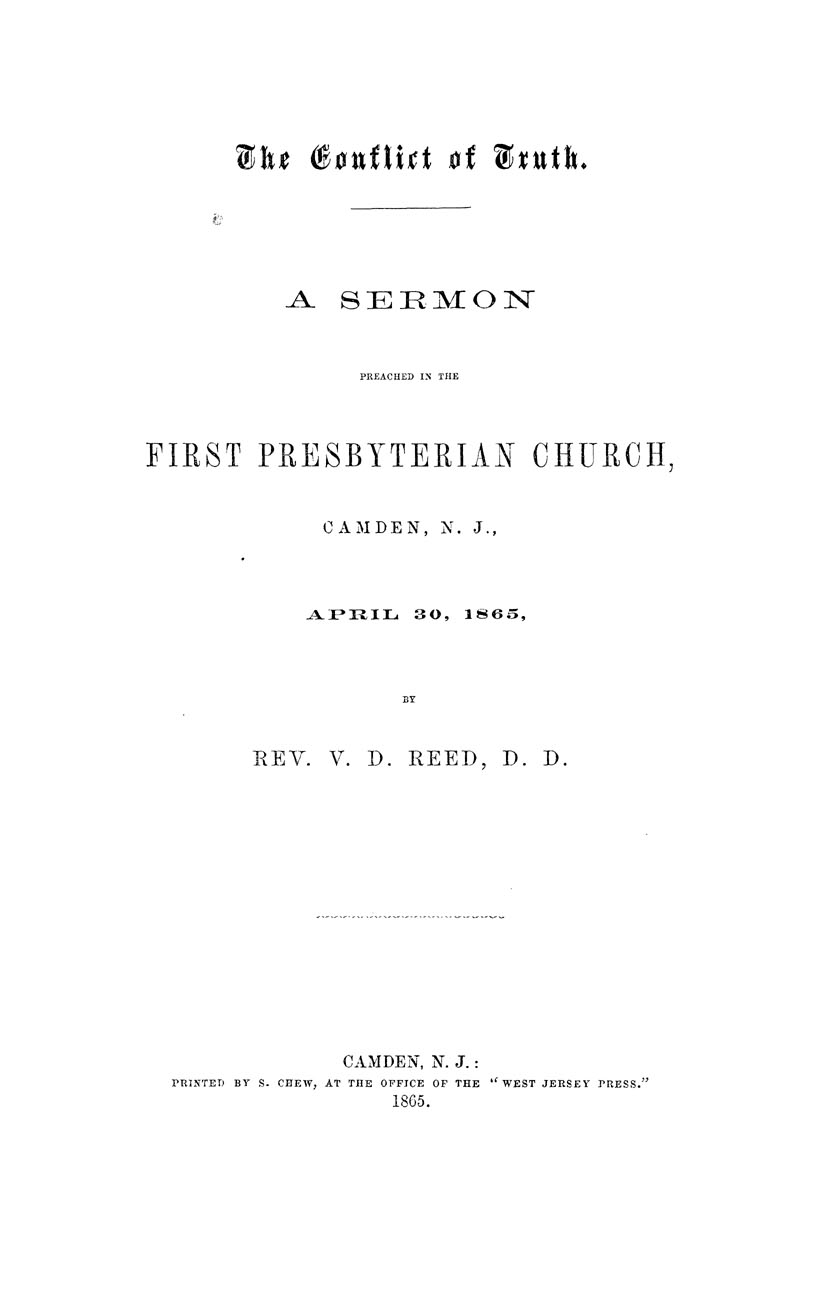
-
Description
Sermon preached by Villeroy Dibble Reed In The First Presbyterian Church, Camden, New Jersey.
-
Source
-
Rights
This item is in the public domain. As a service to other researchers, we request that users credit the Emory University Libraries as the source.
-
Creator
Villeroy Dibble Reed
-
Publisher
S. Chew
-
Date
April 30, 1865

